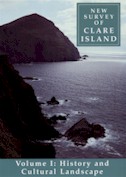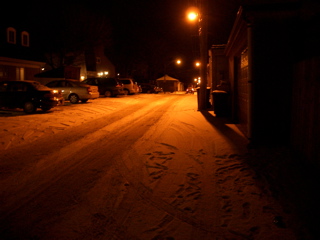 For several years, anyway, I’ve had an alert on file at a site called Abebooks, formerly the Advanced Book Exchange. The alert (or want, in book-searching parlance) is for anything having to do with Clare Island, off the coast of County Mayo in the west of Ireland. It’s significant because my mother’s mother’s family were Clare Islanders who emigrated to Chicago in the 1890s.
For several years, anyway, I’ve had an alert on file at a site called Abebooks, formerly the Advanced Book Exchange. The alert (or want, in book-searching parlance) is for anything having to do with Clare Island, off the coast of County Mayo in the west of Ireland. It’s significant because my mother’s mother’s family were Clare Islanders who emigrated to Chicago in the 1890s.
So, not to go into all the details, recently a Clare Island item popped up through Abebooks. It’s the first volume of a sweeping scientific and cultural study of the island started in the 1990s, titled plainly "New Survey of Clare Island." I’ve known it was out there, and also have read a little bit about the history of the project. It was undertaken partly because of modern residents who are working to uncover and preserve the island’s heritage and partly because Clare Island was the site of one of the first exhaustive multidisciplinary scientific studies of a single locale anywhere in the world, back at the beginning of the last century. The results of that first Clare Island survey were published by the Royal Irish Academy from 1911 through 1915; the first summer I was in Berkeley, in 1976, I found the survey volumes at the Doe Library on campus and wasted many afternoons poring over them (and not understanding a lot of what I read, because much of the matter was rather serious biology and geology and such).
I ordered the first volume from an East Coast bookseller a couple weeks ago, and it came in the mail today. It deals with the island’s "history and cultural landscape," subjects that I might have a chance of understanding. I leafed through the book this evening, and happened across a couple of passages written within a few years of when first Martin O’Malley (in about 1895) and then his wife, Anne Moran, and children (in 1897) left their home for the city in the middle of America.
The first was written in 1892 by a kind of government inspector sent to look into conditions on the island — conditions had been deteriorating for decades, since even before famine struck in 1845 — and what might be done to improve them. Number 30 in a list of points of information sought was this: "Character of the people for industry, etc., etc." The inspector was brief and to the point:
"The inhabitants … have lost almost all habits of industry and self-reliance. They have good holdings of land as a rule, and the mountains adjacent, on which their stock graze, are celebrated for their feeding qualities; but they live very extravagantly, and in good years make no effort to lay by anything to meet adverse circumstances."
As for improvements, the inspector suggested better livestock husbandry, encouragement of fishing, abolishing traditional landholding customs, and "perhaps most important of all: Discouraging gratuitous relief being given under any circumstances. …"
The second brief account comes from an ethnographer who visited the island in 1896. As quoted in the survey:
"To the casual visitor the people are decidedly attractive. Like all dwellers in out-of-the-way places, they are somewhat shy of and suspicious of strangers at first; but after the crust is broken they are kind, obliging, and communicative. With each other they are rather social, and given to joking and laughing, and they seem to have a rather keen sense of the ludicrous. They are very excitable, and said to be somewhat quarrelsome at times. The island used formerly [to] have rather a name for outrages, but none of these seem to have been very serious, and they were most likely largely the outcome of this excitable disposition, and to the nature of the social surroundings of the time. They are decidedly talkative, especially among themselves. Drunkenness may be said to be unknown. They are very kindly to one another in times of trouble or distress. The charge of laziness has been brought against them, and with some degree of justification; but the manner in which they worked when organised by the Congested Districts Board, and when they had some real inducement to do so, leads one to think that they did not work on account of having no real interest in doing so."
It all sounds so familiar: Excitable, extravagant, lazy. Keen sense of the ludicrous. Quarrelsome. Shy and suspicious. Kind and obliging. Decidedly talkative.

